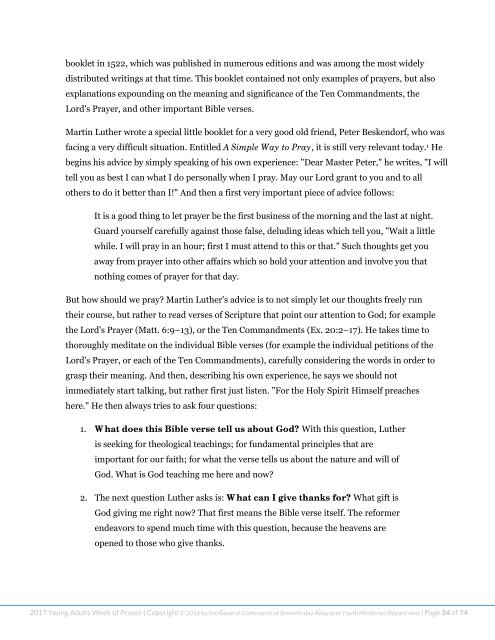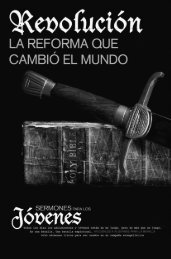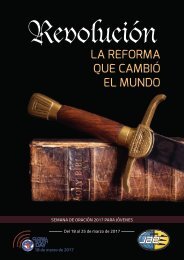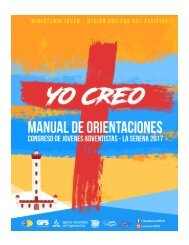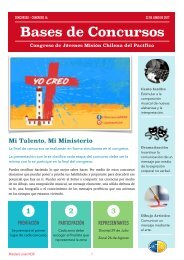Temario Semana de Oración JA - Ingles Asociación General
Create successful ePaper yourself
Turn your PDF publications into a flip-book with our unique Google optimized e-Paper software.
ooklet in 1522, which was published in numerous editions and was among the most wi<strong>de</strong>ly<br />
distributed writings at that time. This booklet contained not only examples of prayers, but also<br />
explanations expounding on the meaning and significance of the Ten Commandments, the<br />
Lord's Prayer, and other important Bible verses.<br />
Martin Luther wrote a special little booklet for a very good old friend, Peter Beskendorf, who was<br />
facing a very difficult situation. Entitled A Simple Way to Pray, it is still very relevant today. 1 He<br />
begins his advice by simply speaking of his own experience: "Dear Master Peter," he writes, "I will<br />
tell you as best I can what I do personally when I pray. May our Lord grant to you and to all<br />
others to do it better than I!" And then a first very important piece of advice follows:<br />
It is a good thing to let prayer be the first business of the morning and the last at night.<br />
Guard yourself carefully against those false, <strong>de</strong>luding i<strong>de</strong>as which tell you, "Wait a little<br />
while. I will pray in an hour; first I must attend to this or that." Such thoughts get you<br />
away from prayer into other affairs which so hold your attention and involve you that<br />
nothing comes of prayer for that day.<br />
But how should we pray? Martin Luther's advice is to not simply let our thoughts freely run<br />
their course, but rather to read verses of Scripture that point our attention to God; for example<br />
the Lord's Prayer (Matt. 6:9–13), or the Ten Commandments (Ex. 20:2–17). He takes time to<br />
thoroughly meditate on the individual Bible verses (for example the individual petitions of the<br />
Lord's Prayer, or each of the Ten Commandments), carefully consi<strong>de</strong>ring the words in or<strong>de</strong>r to<br />
grasp their meaning. And then, <strong>de</strong>scribing his own experience, he says we should not<br />
immediately start talking, but rather first just listen. "For the Holy Spirit Himself preaches<br />
here." He then always tries to ask four questions:<br />
1. What does this Bible verse tell us about God? With this question, Luther<br />
is seeking for theological teachings; for fundamental principles that are<br />
important for our faith; for what the verse tells us about the nature and will of<br />
God. What is God teaching me here and now?<br />
2. The next question Luther asks is: What can I give thanks for? What gift is<br />
God giving me right now? That first means the Bible verse itself. The reformer<br />
en<strong>de</strong>avors to spend much time with this question, because the heavens are<br />
opened to those who give thanks.<br />
2017 Young Adults Week of Prayer | Copyright © 2016 by the <strong>General</strong> Conference of Seventh-day Adventist Youth Ministries Department | Page 34 of 74


